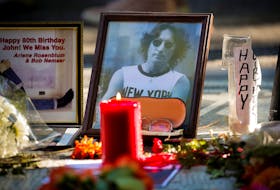In the wake of the killing of George Floyd at the hands or knee of Derek Chauvin and the Minneapolis Police Department, demonstrations have been mounted across the United States, and in major cities throughout the world, in protest of police brutality, excessive use of force, and systemic racism and violence toward black people, typified by Floyd’s senseless, tragic death. In Toronto, Montreal, Ottawa, Halifax, and other Canadian cities, protesters marched in solidarity with the American demonstrators, as well as to protest the death of Regis Korchinski-Paquet, a black indigeneous woman who fell from her balcony in late May, whose family is pursuing the claim that her death was caused by Toronto police.
These demonstrations — some of the largest and most sustained in recent history — are about more than demanding justice for George Floyd, which, as a direct consequence of protest, has already been partly achieved. (All four of the officers involved in his death have been fired and now face criminal charges.) What’s being called for now is comprehensive, fundamental, even revolutionary change. The United States — and of course Canada — has a problem with racism and criminal justice. The solution isn’t reform. It’s to defund the police.
This is not a position easily understood. It requires seriously rethinking our assumptions around law and order, community, justice and civic responsibility. Defunding the police represents an effort to confront the problem not by making minor adjustments, but by completely reimagining the role of the institution itself.
An idea once considered radical, defunding the police has suddenly been propelled by this movement into the mainstream. Los Angeles has decided not to move forward with a planned increase in police spending, and in fact will reduce the police budget by upwards of $150 million. In Minneapolis, where the protests began, city council president Lisa Bender says the city intends to “dismantle” the police department and “replace it with a transformative new model of public safety.”
What does defunding the police actually look like? Alex S. Vitale, in his extraordinary book The End of Policing , outlines the necessary changes so clearly and lucidly that the concept starts to look simple. He begins by identifying the most flagrant issues: the militarization of law enforcement, the criminalization of homelessness and most sex work, the “you vs them” attitude instilled by training academies, the school-to-prison pipeline, the useless and malign War on Drugs.
Police officers in North America are tasked to do too much. They’re trained to see themselves as warriors and other people as potential threats to be contained or eliminated. They target black and other non-white people at rates that are wildly disproportionate. There’s not enough transparency and next to no accountability.
Reforms remain paramount — for the suspension of paid administrative leave for cops under investigation, for new and better training that emphasizes deescalation and community relations. But these reforms, Vitale argues, “must be part of a larger vision that questions the basic role of police in society.” The larger truth about law enforcement is that these problems are too fundamental to iron out like wrinkles. They’re part of the fabric of the police. Most of the critical reforms “would be ignored, resisted, and overturned,” while cops “will continue to reproduce their political power by fanning fear of the poor, non-white, disabled, and dispossessed,” thereby further centralizing and empowering the institution.
The problem is that most reforms expand the reach of policing. The most recent changes introduced to reduce police brutality and help improve community relations, such as body cameras, civilian review boards and “community policing” programs have merely amplified the scale of the police and increased police funding, effecting no real change in how cops approach their jobs.
As Vitale points out, “more money, more technology, and more power and influence will not reduce the burden or increase the justness of policing.” What will is smarter investment and planning: “developing robust mental health care and creating low-income housing systems,” or creating “real avenues out of poverty and social isolation” in neighborhoods with high concentrations of crime.
Whenever the idea of defunding the police is raised, crime is always the immediate objection. Without cops, who will protect us? Who will prevent thieves from stealing, violent criminals from running amok, murderers from eluding justice? But defunding or even abolishing the police entirely, doesn’t mean that no one should investigate murder. It simply acknowledges that a very, very small percentage of cops are involved in murder cases to begin with, and that the overwhelming majority of cops are involved day to day with situations they are plainly unequipped or ill-suited to deal with.
The alternative proposed is simple. Someone is sleeping on a park bench: instead of a cop, a city employee comes by and offers shelter. Someone is doing drugs in public: instead of a cop, a substance use professional intervenes and determines if they need help. Someone is shouting and behaving erratically in the street: instead of a cop, a social worker trained in dealing with people with mental illness approaches and calms them down, guiding them home or bringing them somewhere for assistance. Earlier this week, an indigenous woman named Chantel Moore in Edmundston, New Brunswick, was shot and killed by police who had come to perform a wellness check at the request of a concerned boyfriend. Does it makes sense for an armed cop to perform a wellness check?
These are not changes anyone expects will be made overnight. They are serious, sweeping changes, and are bound to be controversial, in Canada as much as in the United States. But this year, Toronto City Council approved a budget increase for Toronto Police Services of more than $40 million. Of its $13.5 billion total operating budget, the city spends $1.076 billion on police services. That’s more than the city spends on firefighters, paramedics, libraries, and public housing — more than it spends on all of them combined. The point isn’t that we ought to flip a switch and watch the entire police just vanish in an instant. It’s to drastically cut back, and to reinvest that money into programs and services that will actually do good. It’s to defund the police.
Subscribe to our news podcast, 10/3, on Apple Podcasts
Copyright Postmedia Network Inc., 2020







